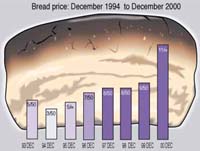
3rd December 2000
News/Comment|
Editorial/Opinion| Business| Sports|
Sports Plus| Mirror Magazine

Help! Bread's gone up again!
By Chamintha Thilakarathna
 T.K.Wijeratne
(61) from Nedimala was in for a shock last week when he walked into the
boutique near his home. Not only was the price of bread up but buns and
cakes too had been increased by a rupee overnight.
T.K.Wijeratne
(61) from Nedimala was in for a shock last week when he walked into the
boutique near his home. Not only was the price of bread up but buns and
cakes too had been increased by a rupee overnight.
The loaf of bread was Rs.11 and weighed only 350g, while tea buns and "kimbula" were Rs. 6 each.
With the money he had, he was able to buy only a loaf, like thousands of people who found to their dismay that all flour-based products had gone up in price. For soon after the announcement of the Rs. 2 hike in wheat flour, bakery owners were quick to change the price tags on all other products.
Consumer dismay has doubled following the rise in the cost of kerosene, diesel, gas and the anticipated seasonal price increases in December.
A rough calculation of the number of loaves baked indicated that for many people bread has now become a staple food. The popular bakeries within the city of Colombo bake over 50,000 loaves each while the main bakeries in the outstation areas bake over 10,000 loaves each. Add to this the short-eats and buns and you get the picture.
Buns and short-eats we can overlook, as 75% of the flour is used for the bread," said the President of the Bakery Owners' Association of Sri Lanka, Parakrama Dasanayake.
Bakers suffer a 12-cent loss in bread production. With the price increase they should only raise the price of bread by .67 cents. Yet, bakers have the liberty to price their goods as they please. The lack of regulations when changing prices of basic consumer items such as bread, forces the public to purchase them at exorbitant rates. In many bakeries a loaf costs Rs.11-13. Though the Association took a unanimous decision last week to increase only the price of bread, bakers have marked up the price of other flour-based items, making irate consumers question the role of the Association.
Mr. Dasanayake said bakers cited other price hikes, such as diesel and gas, for the varying prices of a loaf. "When your ovens are run on gas or diesel, that too adds to the cost."
Royal Bakery Joint Manager, Bandula Perera said there was no reason to increase the prices of all food items. "There is no need to increase the prices of short-eats and buns because the one-rupee increase on bread will cover the cost."
The Royal Bakery has upped the price of bread from Rs.9.50-10.50 and that too only from December 1. The two-rupee increase on a kilo of flour means that bread prices should go up by about .25 cents. When the price of a loaf of bread is increased by one rupee, it compensates for a possible loss on other food items, Mr. Perera said.
However, not all bakers agree with Mr. Perera or Mr. Dasanayake and the across-the-board revision of prices was proof of that.
Meanwhile, restaurant owners who sell short-eats on a small scale are also worried. "We were having good business selling short-eats apart from lunches, but now we cannot afford to do that. We could buy them to be resold at our outlet, instead of making them ourselves," said M.H.Ghazali, Proprietor of Malaysian Foods on Station Road, Bambalapitiya.
The price hikes of diesel, gas and flour have left Mr. Ghazali with few choices. "Reselling purchased food would leave us with a 15% profit compared to the 65% profit earlier," he lamented.
What do officials have to say about the public outcry? CWE officials told The Sunday Times that the government had borne a loss of Rs. 4 on each kilo of imported flour in the past few months. The Finance Ministry had provided a subsidy of Rs.700 million. Seventy-four percent each million ton of wheat imported was converted into flour, a major portion of which was used for bread. They said that the Finance Ministry could not afford the reduction of flour prices from Rs.15.95 to Rs.14.95, a few months back and took a decision to raise the price.
The price increase is a positive step in coping with financial stress where the government paid Rs.18 for every kilo of flour imported while selling it for less. "The issue is not what price the flour is being purchased for, but at what price the final products are being sold at. Bakers never bring down prices when flour prices go down. If they comply with price trends, the public would not be badly affected," said one CWE official who wished to remain anonymous. According to CWE officials the two-rupee hike on flour has not solved the problem of losses. Only an increase from Rs.16.95 to Rs.18 per kilo will help. Does this mean another price rise? For bread consumers, only time will tell.








![]()
Front Page| News/Comment| Editorial/Opinion| Plus| Business| Sports| Sports Plus| Mirror Magazine
Please send your comments and suggestions on this web site to

